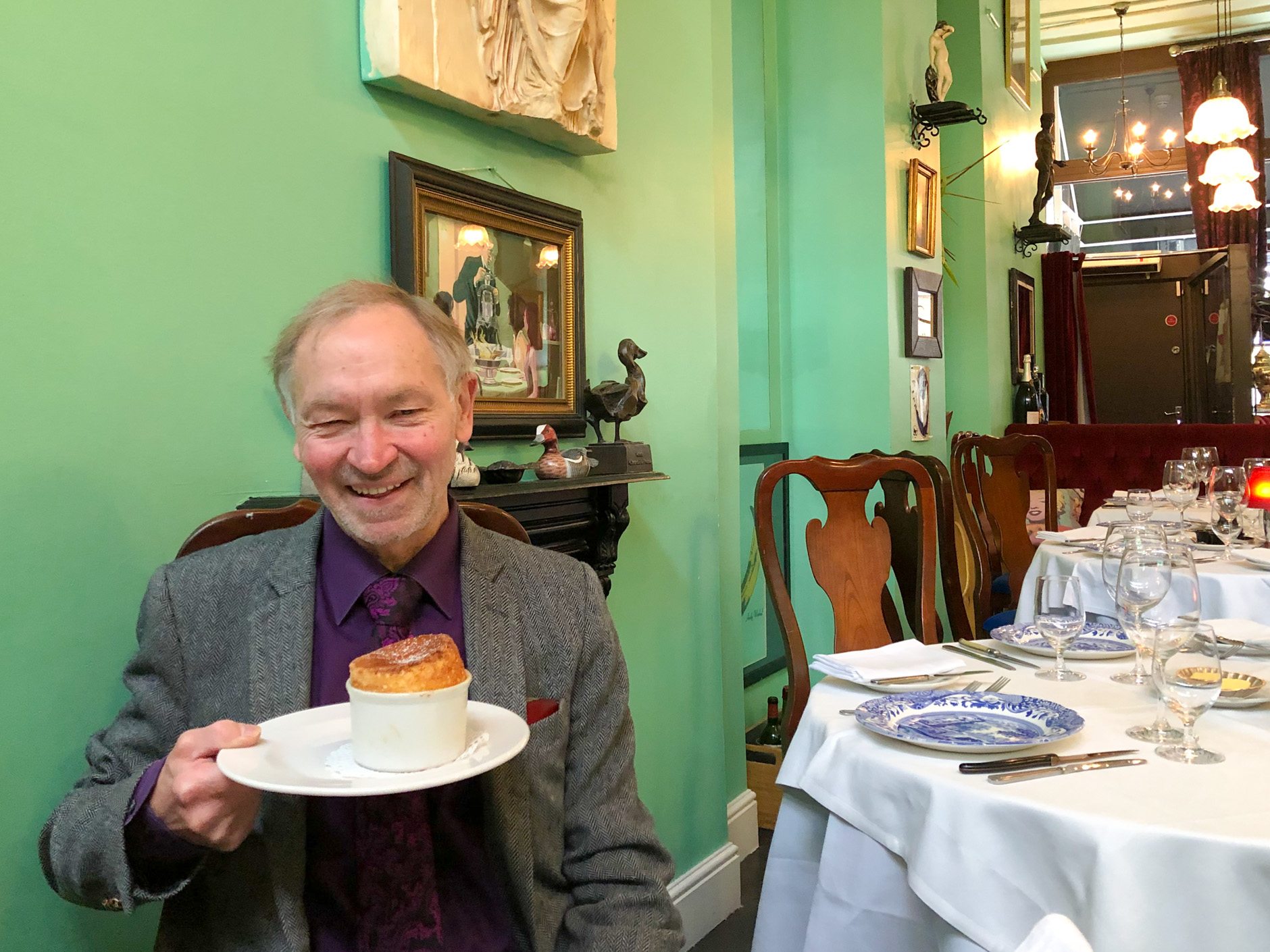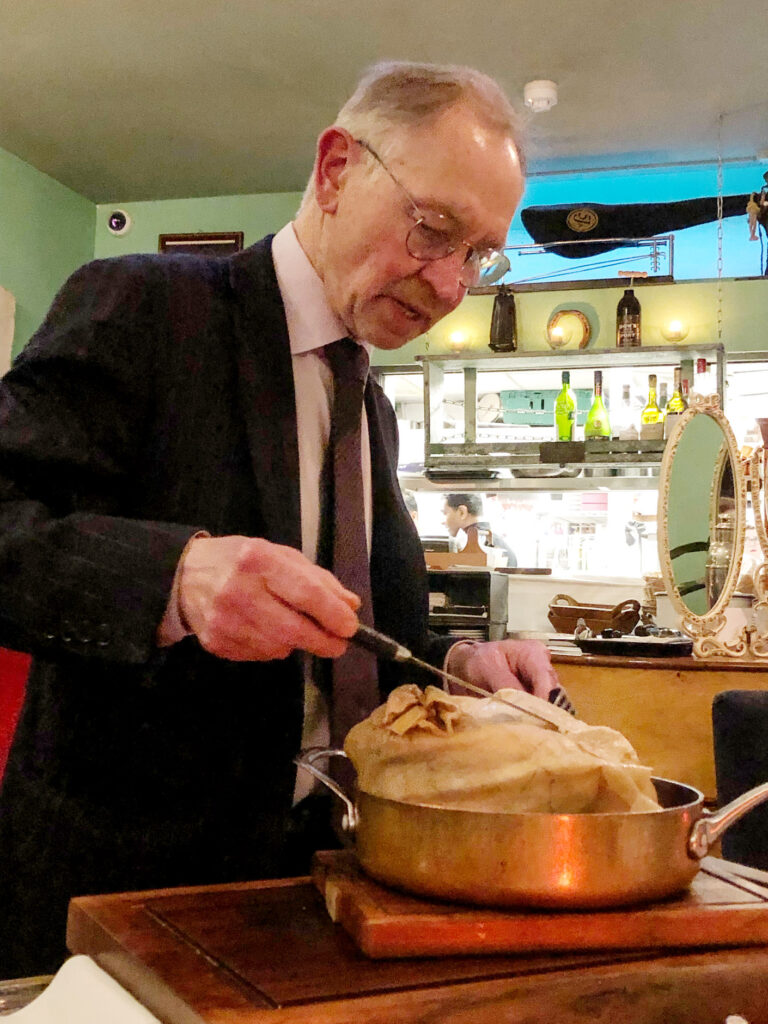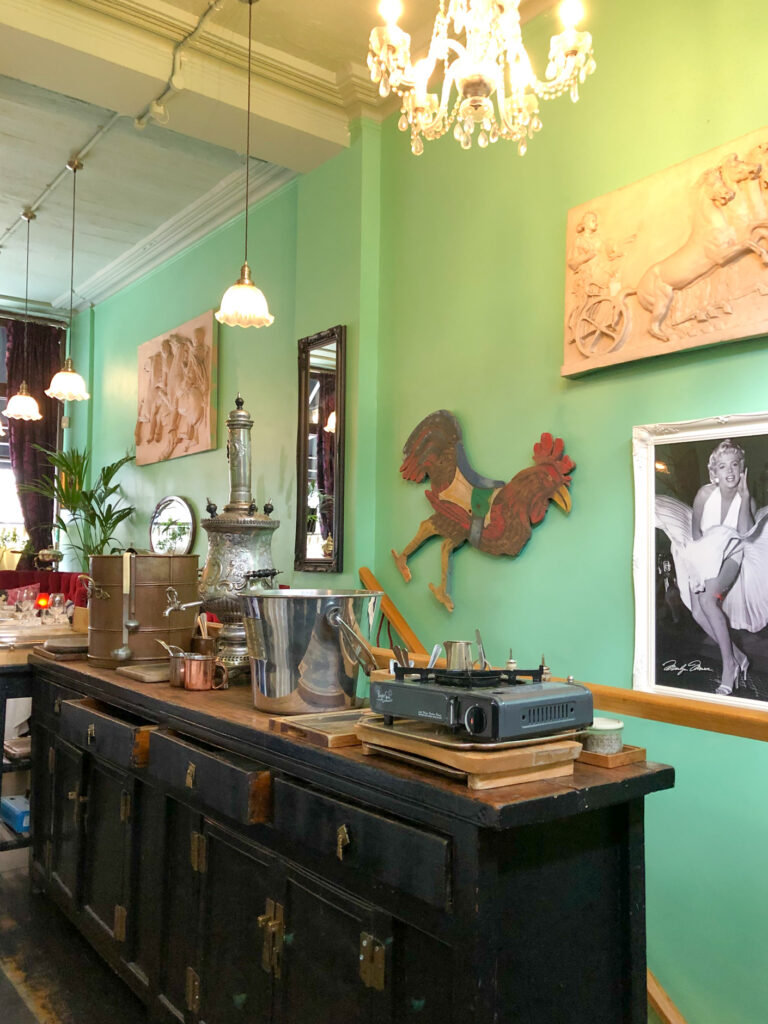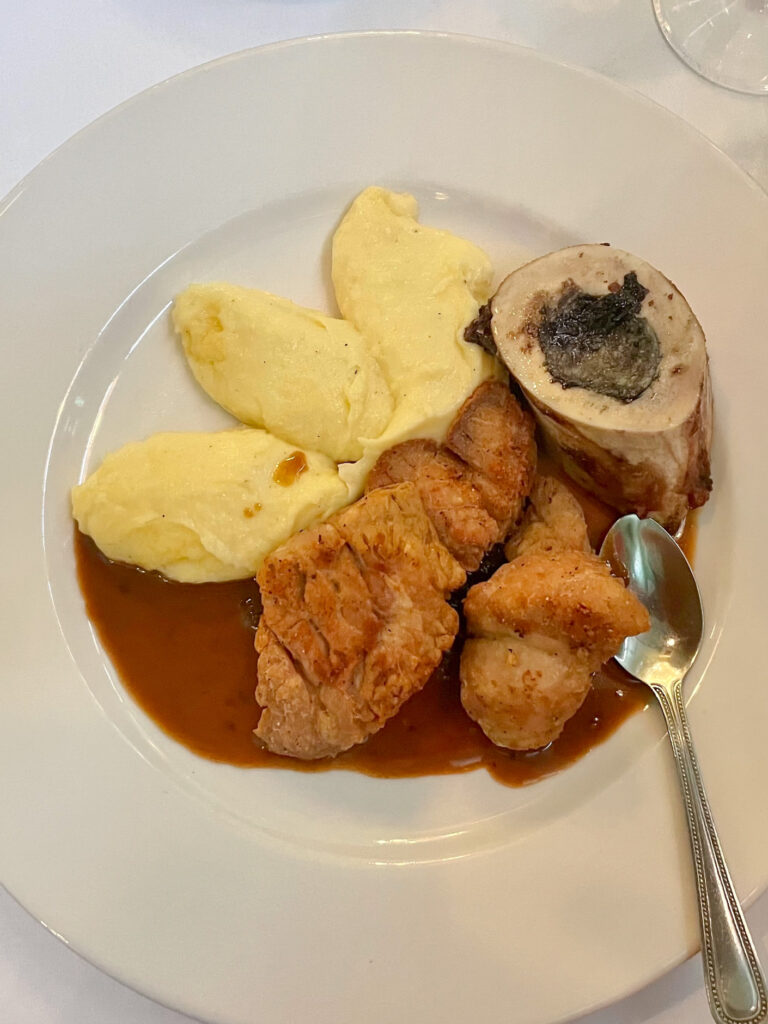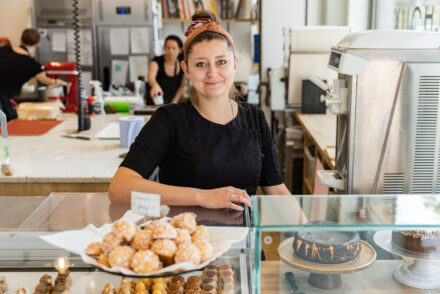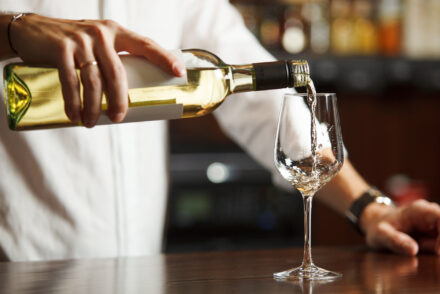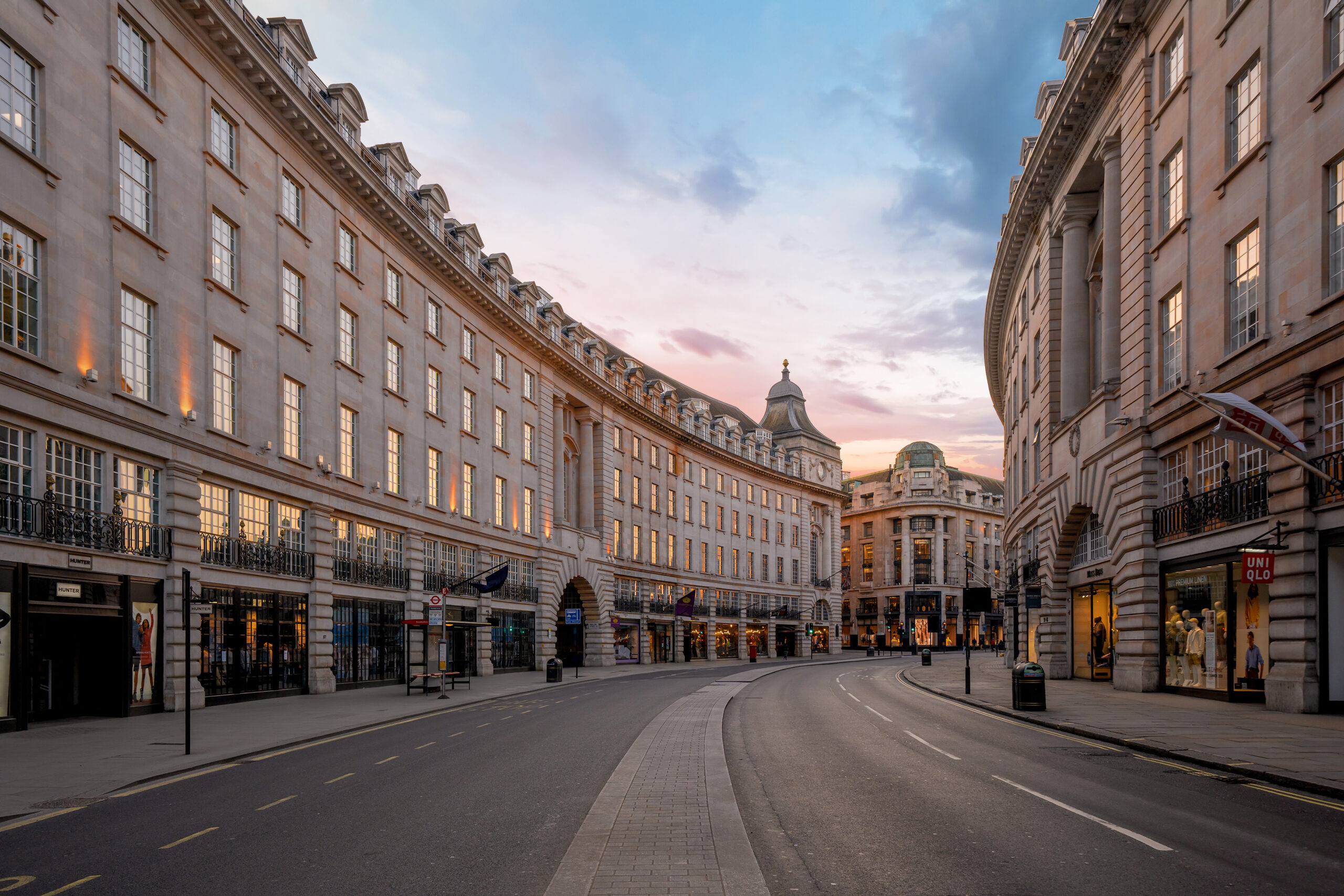For many in the hospitality world, living legend Otto Tepasse needs no introduction. His CV includes stints at Plaza Athénée, La Tour d’Argent, Maxim’s and Stringfellows, and his regular customers are a Who’s Who of celebrities, critics and industry grandees. Since 2011 he has been centre stage at his eponymous restaurant Otto’s in Clerkenwell, bringing duck and lobster presses back to the dining room and continuing his extraordinary dedication to the art of service. A meal at Otto’s is a truly unforgettable, life-affirming experience.
Over a ‘light breakfast’ Otto (OT) spoke to J A Smith (JS) and Amanda David (AD) about his career, the inspiration behind his restaurant, Brexit, critics and much more. This epic conversation has been edited down for length and for certain stories that will remain, like countless others, within the four walls of Otto’s…
AD: Otto, talk me through your career in hospitality.
OT: I started in 1971 when I was 15 in Ausberg. I was one of two apprentices in a hotel, with a real sergeant major type manager. He gave each of us a broom and told us to sweep his office. At that point I’d never done a day’s work in my life. But instinctively I knew to start in the corner – I still hate it to this day when people don’t know how to sweep – and the other guy started in the middle. In Germany you have carnival season which starts in November and finishes in February; celebrations go on until 3am, then I had to start breakfast at 6am. But after the 3am sessions I was drinking Dom Perignon while the other apprentice was still toiling away. It just goes to show what a difference it makes when you know how to use a broom! Shortly afterwards I began working in the restaurant; in fact, the first customer I ever served was Björn Borg. I think I served him a fillet steak and chips with béarnaise. He was a bloody good tennis player. I ended up serving him again at Stringfellows in the 80s!
AD: So you decided that was the life for you?
OT: I’ve never looked back since. 51 years and never a day off sick.
JS: When did you move to Paris?
OT: After the apprenticeship I went to West Berlin as a commis and worked there for a year, then I moved to Paris, to Plaza Athénée then Maxim’s and then La Tour d’Argent. Maxim’s was amazing; we had some kind of royalty in every night. It had the main dining room, then the dancefloor with the band at the end. A restaurant with music usually doesn’t work. However, there it did.
JS: And then to London?
OT: I started in London at the Mirabelle in ‘76. That was still one of the best restaurants – not like in its heyday but still very good. Half of the staff from Mirabelle went to open Annabel’s. I was the youngest chef at 19; the next youngest had been there 25 years, the head chef for 50 years. Everything was done at the table. There were big tables, up to ten people; all the vegetables were in individual dishes and had to be heated up at the table and served – can you imagine? I don’t know how I did that. We had a customer there who always sat in the same seat. Weirdly, that person came here to Otto’s and he remembered me from 1976!
We worked in shifts and the other guys used to lock everything up. You couldn’t find coffee spoons, you couldn’t find service spoons and you couldn’t find avocado dishes. I used to spend my day running around after those three things, I’m not joking. Just before I left, we had the whole De Vere board there for a meeting on a Saturday morning. Everything was locked up and I couldn’t for the life of me find 16 coffee spoons, so I gave them all dessert spoons with their coffee. There was absolute silence as I put the cups down. I had no problems finding coffee spoons after that.
After the Mirabelle in ‘78 I worked at a restaurant called Inigo Jones which was opposite the Garrick Club. It was owned by two antique dealers. That restaurant was so well run, the service there was amazing. Actually I worked with Jesus Adorno there, he was the head waiter before he went to Le Caprice. In Berlin I worked at the Kempinski Grill Room that opened at 8pm and closed at 3am; I used to spend four hours polishing the silver and cutlery before service. There were about nine tables with more than 20 waiters. Everything was done at the table, it was incredible. I obviously made my own choices but I’ve been very lucky.
JS: Do you think your restaurant today is a distillation of everything you’ve learnt?
OT: Yes, definitely. After I left Stringfellows I opened my first restaurant in Covent Garden. It was very good; we came number two after Le Gavroche in the 1983 Good Food Guide. My restaurant today is a more sophisticated version of that, with a similar vibe. That was the only restaurant where I’ve ever done different sittings. At the time the musical Cats had just opened so we were busy pre-theatre, then with normal evening bookings, then later for post-theatre and opera. I hate when you book a restaurant and they say you have to leave after an hour and a half. We don’t do that here. I’ve had people staying overnight; literally, coming in at lunchtime and still being here at 10am the next morning!
I wanted somewhere that wasn’t stuffy or pretentious, but genuine, and very good. We make everything here, all our stocks and sauces, everything. All of our produce is top quality, fresh not frozen, and we prepare it traditionally. There’s nothing intensively farmed or hormone-fed; that’s why I don’t do chicken except the Poulet de Bresse, it’s the only one that doesn’t taste of fish because of the feed. Most Michelin star restaurants won’t serve it because you can’t put a full mark up on it. I wanted to do choucroute but it’s extremely difficult to get right, you need the time to marinate it. My grandfather used to pickle the choucroute, leave it in a barrel and it was food for next winter.
I have to say, I love this business. At 66, I want to come to work. What else would I do?
AD: Do you have a favourite dish from here?
OT: The duck – it’s the standout dish – then the steak tartare and the smoked salmon. I’ve got two antique serving boards for the salmon. It took me three years to find them; they used to be everywhere. But nobody carves salmon at the table anymore; they’re all pre-sliced, which is never as good.
JS: There’s something unique about your restaurant; like any good writer, there’s an authenticity, a clear sense of what you want to achieve.
OT: I never do anything that I wouldn’t want to happen to me in a restaurant. I always think, what would I like? And I’ve never been one to smile. There’s nothing worse than someone going around smiling because they’ve been told to smile. You can tell immediately.
AD: The décor is quite eclectic too, but it really works.
OT: You’ll find bits here that remind me of my childhood. Everything you see here has some relevance. The Greek carvings that’s Homer and the Iliad. The picture of Marilyn is because I had three dreams: Paris, New York and Marilyn Monroe. The chicken is because I come from a small village and my grandfather had a farm. I remember to this day my mother making lunch and just going out getting a chicken and wringing its neck; that was the chicken for lunch. So everything has a meaning. The red banquettes remind me of Maxim’s, and obviously the presses from La Tour d’Argent. The blue chairs: originally the walls were painted white and with the banquettes it was supposed to represent the French flag but nobody got it.
AD: The presses are extraordinary. Did you have those from the start?
OT: We opened in 2011 and I got my first press in May 2013. It came from the Hotel Provençal in Juan-les-Pins; it was made for them in 1927 and it’s one of the original Christofle presses. Then luckily I got the lobster press, which is the first one ever made. I think it was made for the 1900 Paris Exposition as a counterpoint to the duck press, because nobody did pressed lobster in those days. It must have been because of La Tour d’Argent; they started with ducks in 1890. There are only five lobster presses in the world: one in a museum and four in use, including mine – that’s it.
At the moment because there is bird flu in France there are no ducks. Everything has been wiped out including the parent genes. Scientists have now been given the go-ahead to try to reproduce the genes – quite amazing isn’t it? So I’m hoping to start again in late September, because obviously it will take a minimum of 8 weeks.
At this point in the interview, having greeted us with a Martini (JS) and a peach Bellini (AD), Otto presents us with a ‘Leopold Bloom’ breakfast: a plate of andouillette and fresh, barely-set black pudding on a bed of pea purée with truffle sauce. It is 10.30am.
JS: Is this a typical breakfast for you Otto?
OT: No, normally andouillette is served as a main course with mashed potato and mustard sauce to cut the taste but I didn’t want to do that. I didn’t want just the taste of andouillette because I know a lot of people wouldn’t like it. With this if you mix these together with a bit of the purée and the sauce, it just sort of balances out.
Team Palate tuck in valiantly.
OT: What I want to do here is to make it sophisticated – like the lobster, the duck, the chicken – but balance that with how you would eat it in the countryside. That’s the idea. If you eat andouillette on its own you can really taste the stomach. The black pudding sweetens it and makes it less pungent.
Otto polishes his off and watches us eat – approvingly, we hope.
OT: Well if you survive andouillette you can eat anything; that’s what I call a breakfast for sophisticated peasants! And with a Martini to numb your senses!
JS: I think this is the earliest I’ve ever had a Martini! Back to ducks, chickens and lobsters, has Brexit had an effect on importing produce?
OT: Prices have obviously increased a lot, but there’s been no issue with supply for me because most of our imports come from small farms. But staffing, that’s a different question – and it’s going to be ongoing. There was a time that London was the best city in Europe; but now, after Brexit, you feel it doesn’t have the same vibe.
JS: Do you think it would help if we could encourage more British people to work in hospitality?
OT: It would help but it’s not really going to happen is it? There will be some but if it’s not seen as a career path in this country, what’s the point? The worst ones are the ones that are supposedly skilled but have all the bad habits; it’s impossible to unlearn them.
JS: And especially if they don’t know how to sweep…
OT: Indeed. Everybody relies on each other here. It’s a small kitchen and there’s nowhere to hide; if you’re not helping then you’re in the way.
Eating out is an art; you need to know how to do it.
AD: You’re known for doing a lot of preparation tableside.
OT: If you have a restaurant, you need three things: a kitchen, service and ambience. If one of those things doesn’t work it’s not a restaurant. So that’s why I do a lot of things tableside. I wanted to rebalance service and food. When I first started here, everyone said it shouldn’t work and I wondered why. Then I realised they’d never done it, they had no idea. I’ve done this all my life, but they couldn’t see it. Also when I started we had no money; for the first six months I just had a chef de partie, so a lot of things had to happen tableside. Now it’s everywhere: the flambéing, the duck. La Tour d’Argent stopped and sold all their duck presses, now they’ve started doing it again – it’s quite amazing. Look at The Ritz, they didn’t do it until recently. Everything goes round in circles. Everything comes back and there’s nothing new under the sun.
JS: So when you’re not working, where do you like to eat out?
OT: Before it was nice to go to a restaurant, look at the wine list, the whole thing. Now I can’t be bothered because I don’t drink anymore. I used to be a Champagne person, it was literally like water to me. I haven’t had any alcohol for five and a half years, not even a sip; I don’t miss it either, it’s very strange. I haven’t said I’ve stopped forever but in my world there’s definitely no such thing as one glass of wine!
The restaurants I like – Quality Chop House, Maison Francois, Noble Rot, The Waterside Inn – they are really good. But I’m not into El Bulli, that sort of thing, and I’m not into Michelin stars any more. The one thing I hate is perfection. Nothing is ever perfect, except once; the second time it’s just boring. These places that insist everything has to be identical every time, that’s not real life. That’s like being in the army, doing something where you don’t have to think. A restaurant should live on its spontaneity, where you have to react; it’s a living thing.
There are just not that many good Michelin star restaurants. They’re trying to please too many people. When you run a restaurant, you need to choose your customers. You can’t have everybody. Or your customers need to choose you – that’s the best way. I’ve never really had bad customers. Whenever they say someone is difficult, I go and serve them; I’ve never had a problem with difficult customers, ever. I mean, that’s what makes it interesting.
JS: There is a community here, I think, amongst your regulars.
OT: People are extremely loyal. We don’t get a lot of tourists. We get businessmen and lawyers but then we get writers too and a lot of industry people – chefs, restaurant managers – the whole spectrum of society, which is a good thing. Restaurants should be run as if you’re inviting someone into your living room; that’s what a good restaurant is. You don’t invite a guest into your living room and treat them badly do you? We have a lot of regulars so everybody feels comfortable as soon as they walk through the door. The nice thing here is that nobody really worries about what they say; it’s all the same people.
The people keep me going. Everybody that walks through the door is a piece of theatre; they bring their life to you and you engage with it. Actors talk about being on stage for two or three hours and I think, I’m on stage for 16!
JS: Do you think Fay Maschler has helped?
OT: Oh yes. With Fay Maschler it’s very simple: if she hadn’t written about the duck, I wouldn’t be here. It was just a fantastically well-written article. We still have people coming today who came for the first time because of that article. The first time she came with Simon Hopkinson; he booked it but didn’t say he’d be with her. The second time she came with Oisin from The Guinea Grill – although he was still at The Ship then I think, or had just left – a bit like now. I was so hungover and there was nobody here; I was on the point of going home because there was nothing happening. She’s brought Jon [Spiteri] here too. He’s a real character, a very nice man.
AD: How did the Soufflé Fay happen?
OT: I just genuinely wanted to do something for her to mark what she’s done. When we first did the lobster, it was with lobster ice cream. Weirdly enough, a week ago somebody asked for it. It took me a moment to react because I had completely forgotten about it. So, I wanted to do something different but still really good; I have to say, that lobster soufflé with the caviar and the lobster sauce is fantastic.
AD: She’s a regular herself isn’t she?
OT: Yes, she is incredible. She’s a proper restaurant reviewer; it’s not just an opinion, it’s based on knowledge and judgement. She gets right to the point. She was the first one to do a mainstream review. After that, the other two who were really influential were Tim Hayward from the Financial Times and of course Jay Rayner. We still get people mentioning his article when they order the steak tartare. It was the same with Jay; I was just walking out the door and I saw him getting out of a taxi, so I turned straight around. I think he was the only table. And I never had a head chef here whenever we had a review – incredible isn’t it? It’s a funny business but I wouldn’t want to do anything else.
Our ‘breakfast’ continues with a generous plate of pan-fried sweetbreads, served with roasted bone marrow and pomme purée.
JS: On the subject of reviews, do you think social media is a good thing?
OT: Personally I think it’s total rubbish. With social media now everybody’s a food critic. A lot of it is people wanting to feel important; they’ll go to a restaurant just to take a picture. Palate is good because it’s genuine. You don’t go somewhere because somebody pays you.
JS: No, we never do that.
OT: You see, that’s totally different. You can tell when something is PR-driven, the media all jump on the same thing. First of all, you should go to a restaurant because you’re hungry. Then maybe you want to meet with friends, or you don’t want to cook, or you want to eat something you can’t cook at home. I don’t understand what the big deal is about pasta; sure you can go somewhere where they make it fresh but a plate of pasta is a plate of pasta. It costs nothing and they charge whatever they charge – it’s a rip-off. The other thing I don’t get, and it really puts me off if I see it, is burrata. What is that? It’s just taken out of a packet – why would you go to a restaurant to eat that?
Restaurants are very expensive to run. It’s not just the food: you have the rent, the rates, the staff – a good restaurant, any 3-star Michelin restaurant, it’s impossible to make money. The better the restaurant is, the less profit it has. And making people feel comfortable is an art. My favourite is when you go into an empty restaurant and they manage to seat you either at a table by the toilet or next to the only other occupied table; it’s amazing how often that happens.
Restaurants should be run as if you’re inviting someone into your living room; that’s what a good restaurant is.
JS: What keeps you going?
OT: It’s literally the people. Everybody that walks through the door is a piece of theatre; they bring their life to you and you engage with it. You’re also on the stage. Sometimes you can’t get away, everyone wants your attention. Actors talk about being on stage for two or three hours and I think, I’m on stage for 16! You live a life at the table. Once at The Don in the City, I worked for 37 hours straight; we all did. That’s quite something. That’s why I was drinking so much; Champagne was stress relief. There’s nothing nicer than being stressed and having a cold glass of good Champagne and a cigarette.
JS: You seem to have a very strong work ethic. Lockdown must have been quite hard.
OT: Well no, it was like it didn’t happen to me because I was constantly out, or opening up for deliveries from 6am because there was no traffic. Lockdown to me seemed surreal. We were working every single day. It was a weird time though, cycling around central London and it being empty. It’s amazing how many businesses, not just restaurants, have closed down. It’s a shame because many were small family businesses that had been there for years.
AD: What did you do during lockdown?
OT: We were cooking for the NHS; proper three-course lunches for 70-80 people every day, including Sundays. Then in between the first two lockdowns I wanted to do something, so I contacted some people in the government and said I wanted to take on some young offenders as apprentices. Unfortunately they said it was difficult to organise, supervision and so on, and suggested I do something with refugees. So I got in touch with some local councils and took on four apprentices. Then, when lockdown finished and we reopened, it felt perfectly normal because it was all our regulars.
Customers are starting to arrive for lunch so we thank Otto for his time and generosity and rise to leave. He disappears into the kitchen and comes out with two soufflés and two glasses of dessert wine. We sit down again.
AD: It’s become tradition that we ask interviewees for three memorable dishes that they’ve eaten, somewhere other than their own restaurant.
OT: I don’t get a chance to eat out much so I can’t think of anything recent but one of the most memorable dishes for me was when Marco Pierre White opened The Canteen in Chelsea. I had a risotto nero there which was the best risotto I’ve ever had. It was fantastic; the squid ink, the whole thing was just perfectly balanced.
Otto consults with Elin.
Also about 17 years ago I took the staff to The Greenhouse for our Christmas party. There was a 10 or 11 course meal, a mixture of French and Asian, and every single course was outstanding. I’m not sure if they had two Michelin stars at the time but, apart from The Waterside Inn in about ‘84, that’s the only restaurant I can say was absolutely fantastic. I had a good meal in Le Gavroche in ‘83 when Albert Roux was still there but nothing like The Waterside Inn.
JS: I think Le Gavroche had three stars then and it went down to two in the 90s.
OT: A lot of our customers compare us to Le Gavroche and I always wonder why. But then the old Le Gavroche was in Sloane Square, in a kind of bistro setting, which is how all the good restaurants start.
I like simple things now: a really nice piece of fish, a good piece of meat. I love well-made sauces but I’d quite happily have just a plain piece of fish, vegetables or a salad. I’m around food every single day. My father was a very good chef, so for me good food is just something I do. He used to make his own black pudding, or he’d go to the river, catch an eel and smoke it. I have never in my life had a takeaway. I’ve only ever eaten three hamburgers – two here and one in New York – and one Kentucky Fried Chicken, in Pimlico in ‘77 after a nightclub.
Eating out is an art; you need to know how to do it. It’s not just going to some crappy restaurant and taking a picture. We get a lot of customers here, business people from abroad, who have gone to Michelin star restaurants and say this is the best meal they’ve had in London. People genuinely like it here and that’s the buzz you get out of running a restaurant. I have to say, I love this business. At 66, I want to come to work. What else would I do?
This interview took place in August 2022 and was published on 1 September 2022.
Photos by J A Smith and Amanda David.
Otto’s is located at 182 Grays Inn Road, London, WC1X 8EW.

